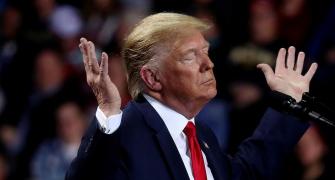Dr Manmohan Singh on Tuesday became the seventh prime minister in nearly three decades to win a vote of confidence in the Lok Sabha.
Of the 10 trust votes taken in the past 29 years, the government of the day won six. In two cases each, the incumbent prime ministers were defeated and resigned without facing the House.
The first time the need for a trust vote arose was in 1979 when Charan Singh was the prime minister after an earlier split in the Janata Party. Sensing he did not have the requisite numbers, Charan Singh did not even come to the House to face a confidence motion and resigned.
The next time a trust vote was moved in the Lok Sabha was a decade later when V P Singh became the prime minister in December 1989. He won but stepped down a year later after the Congress joined hands with the BJP to ensure his government's fall.
Chandra Shekhar, who succeeded Singh, won a trust motion in November 1990 but resigned five months later after the Congress party under Rajiv Gandhi withdrew its support to the government over spying charges.
Congress have never lost a trust vote
P V Narasimha Rao won a confidence vote in July 1993. His government lasted a full five-year term.
H D Deve Gowda won a trust motion in June 1996 but lost in April 1997 when the Congress withdrew its support to his government.
I K Gujral, who succeeded Gowda, won a vote of confidence in April 1997 but resigned in November after losing majority support.
In 1996, Atal Bihari Vajpayee resigned on the floor of the House before the confidence motion could be put to vote, admitting he did not have the numbers in his favour. However, he won a trust vote in May 1998 but lost a year later by a single vote after the AIADMK withdrew support. Vajpayee thus became the only prime minister to have lost a confidence vote twice.
In 2004, Prime Minister Manmohan Singh did not have to move a confidence motion as he was assured of majority with outside support of the Left. The same Left now forced him to seek a vote of confidence after 50 months in power.







